UK National Action Plan on Women, Peace and Security 2018 to 2022: annual report to Parliament 2022
Published 25 April 2023
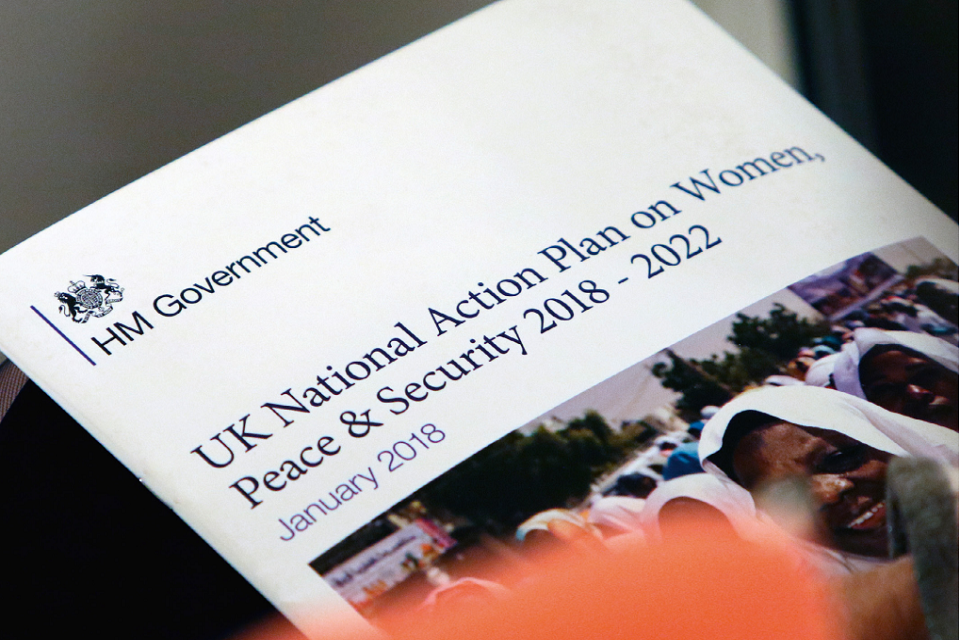
Front cover of UK National Action Plan on Women, Peace and Security 2018 to 2022.
Introduction
This fifth annual report to Parliament sets out progress in 2022 against the objectives outlined in the UK’s Women, Peace and Security (WPS) National Action Plan (NAP) 2018 to 2022. The Foreign, Commonwealth and Development Office (FCDO) and the Ministry of Defence (MOD) jointly lead on WPS.
The UK Government is committed to putting women and girls at the heart of the UK’s foreign, defence and security policy. In 2022, we continued to drive forward implementation of the WPS agenda in an increasingly challenging international environment, marked by evolving and new conflicts and a concerted effort to roll back women’s rights.
In 2022, we conducted an independent final evaluation of the UK’s NAP, which is being published alongside and forms an appendix to this report.
On 23 February 2023, the UK launched its fifth NAP (2023 to 2027).
2022 highlights
The UK led the international community’s pushback against attempts to roll back women’s rights across the globe.
The UK is proud of its reputation as a global leader on WPS and we take seriously our role as WPS penholder on the UN Security Council (UNSC). The UK’s adversaries continue to weaponise gender inequality on the multilateral stage to disrupt the rules-based international system. We continue to use our standing in the UN to champion the inclusion of WPS in UNSC resolutions. For example, in March 2022 we secured strong language on women and girls in UNSC Resolution 2626 (2022) regarding the mandate of the UN Assistance Mission in Afghanistan, by coordinating with likeminded Council members, alongside then-penholder Norway, despite attempts from obstructionist Council members to remove the language.
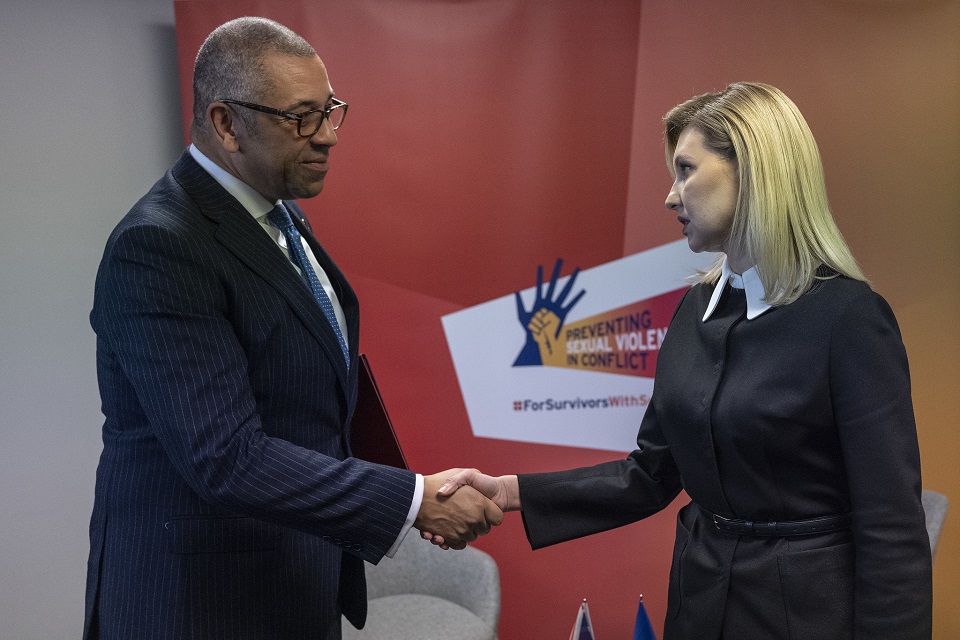
Rt Hon James Cleverly, UK Foreign Secretary, meets Ukrainian First Lady Olena Zelenska at the 2022 Preventing Sexual Violence in Conflict Initiative (PSVI) Conference in London.
The UK is proud to support our friend and close ally, Ukraine.
The devastating conflict in Ukraine has highlighted the disproportionate impact of conflict on women and girls, in particular their vulnerability to conflict-related sexual violence (CRSV) and trafficking. The UK is committed to supporting Ukrainian women and girls in all their diversity, addressing their needs and recognising the critical contribution they are making on the frontline and in communities affected by the invasion. In 2022, we announced £220 million of humanitarian assistance, which prioritised the protection and inclusion of the most vulnerable - particularly women, girls and marginalised groups at increased risk of abuse, neglect and violence. We launched 2 new WPS projects aimed at empowering local Ukrainian women’s rights organisations. We also launched a £10 million fund to support Ukrainian civil society organisations, including women’s rights organisations and a further £3.5 million to boost lifesaving and survivor-centred gender-based violence (GBV) and sexual and reproductive health services in Ukraine and across the region. Finally, we provided specialist UK war crimes, defence and CRSV expertise to the region, to support the ongoing investigations, and facilitated a follow up deployment of a Preventing Sexual Violence in Conflict (PSVI) expert to the Office of the Prosecutor General.
Addressing the disintegration of women’s rights in Afghanistan continued to be a key priority for the UK.
The UK remains committed to the WPS agenda in Afghanistan. We have repeatedly condemned the Taliban’s decisions to restrict girls’ access to education, including through joint public statements and UN resolutions. In March 2022, we worked through the UNSC to strengthen human rights reporting and monitoring, including the situation for women and girls, in the mandate for the UN Assistance Mission to Afghanistan. In October, we co-sponsored a Human Rights Council resolution, which extended the UN Special Rapporteur’s mandate to monitor and report on the human rights situation for another year. The resolution highlighted the deteriorating human rights situation, including the plight of Afghan women.
We played a leading role in mobilising wider international resources for Afghanistan, including for women and girls. In March 2022, we co-hosted an international pledging conference for Afghanistan with the UN, Qatar, and Germany, which raised $2.4 billion for the humanitarian response. We committed £286 million of aid for Afghanistan in FY 2022 to 2023 and committed to ensuring over 50% of our aid reaches women and girls.
The UK led global efforts to tackle conflict-related sexual violence.
Ten years on from the launch of the UK’s Preventing Sexual Violence in Conflict Initiative, on 28 to 29 November 2022 the UK convened partners from around the world at an international PSVI Conference in London. The conference was attended by around 1,000 key stakeholders, including representatives from over 57 countries, the UN, NATO, civil society as well as a wide range of survivors. The conference sent a strong message of sustained UK leadership and international resolve to tackle CRSV. The Foreign Secretary launched the UK’s new PSVI Strategy at the conference, backed by up to £12.5 million of new funding. The strategy focuses on what the UK will do to deliver a strengthened global response, prevent sexual violence in conflict, promote justice, and support survivors. The UK also launched a new Political Declaration which sends a clear message that these heinous crimes must end and outlines the steps needed to achieve this. Fifty three countries and Special Representative of the Secretary-General Patten endorsed the Political Declaration, with 40 countries making national commitments detailing the tangible actions they will take to tackle CRSV.
The UK also focused efforts on developing the UK’s fifth WPS National Action Plan.
In 2022, FCDO and MOD worked jointly to develop the UK’s next WPS NAP, which was launched, by the Foreign Secretary and Minister for the Armed Forces on 23 February 2023. Ministers highlighted the need to ensure the NAP responded to the new global context, reflecting on Ukraine and Afghanistan, transnational threats such as climate and cyber, and ensured the UK maintained its reputation as a global leader on WPS.
The design and development of the NAP was informed by literature reviews, research, and consultations with key stakeholders, and reflects the Foreign Secretary’s emphasis on putting women and girls at the heart of our foreign, defence and security policy. We conducted extensive consultations including: 2 external stakeholder engagement sessions with CSOs, academics, and women peacebuilders; detailed interviews with FCDO and MOD officials including in Fragile and Conflict Affected States (FCAS) posts; and consultations with women peacebuilders in NAP focus countries. We also consulted with other countries to understand their approach to NAP development and ensured there was open communication with key civil society experts, providing opportunity for comments on drafts of the NAP. We valued in particular the support and advice of Gender Action for Peace and Security (GAPS), and Baroness Hodgson of Abinger in her role as co-chair of the All-Party Parliamentary Group (APPG) on WPS.
UK NAP strategic outcomes
In 2022, our embassies in WPS NAP focus countries and beyond continued to drive forward the WPS agenda across the 7 strategic outcomes in the NAP. This section highlights key policy, diplomacy and programming activity against the strategic objectives.
SO1: Decision-making
An increase in women’s meaningful and representative participation in decision-making processes, including conflict prevention and peacebuilding at community and national levels.
In Iraq, the UK’s multi-year £2.7 million WPS programme strengthened the advocacy power of women’s rights organisations by establishing new partnerships within the sector and supporting them to develop a sector-wide advocacy strategy, contributing to inclusive peace and security in communities across Iraq and the Kurdistan Region.
In Myanmar, the UK focused on building the capacity of women leaders to engage in policy consultations, dialogue and peacebuilding, through the UK’s support to the Joint Peace Fund, and elevating the role of women in the humanitarian response. As part of the UK’s broader humanitarian programme partners have equipped women local responders with management and delivery skills to support their participation in humanitarian co-ordination and decision-making bodies.
The UK also provided £135,000 to the UN Senior Women’s Talent Pipeline to improve gender balance at senior levels of the UN, bringing our overall contribution to the programme to over £800,000 since FY 2021 to 2022.
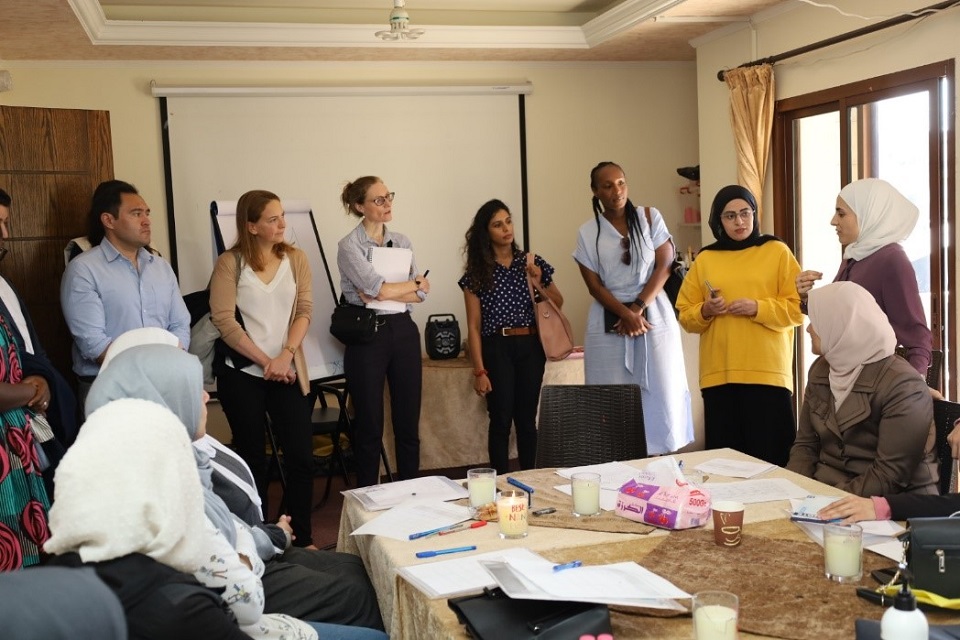
FCDO regional gender advisor visits a women’s centre in Bekaa supported by Women Now for Development, a women-led organisation (WLO) supported by the Women’s International League for Peace and Freedom, Lebanon.
SO2: Peacekeeping
A gender perspective is consistently applied in the setting and implementation of international standards and mandates for peace operations.
The MOD continues to deploy a Gender and Child Protection (GCP) Advisor in the Democratic Republic of the Congo (DRC). This role works with the DRC Force Commander to advise on the importance of women’s representation during all levels of peace support operations. The GCP advisor also provides support to the Female Engagement Teams, who continue to work in the local communities using new opportunities for peacebuilding, community engagement and awareness. A particular highlight was that the GCP Adviser, Lt Col Sophie Gregory, was awarded a UN commendation for her WPS work by the UN Under Secretary General for Peace Operations, demonstrating the value of UK efforts to mainstream gender in military operations.
The MOD delivered 2 iterations of Human Security training to around 80 individuals deploying to Op Newcombe (Mali) in February and April 2022, which included specific training on WPS and CRSV. In addition, UK personnel deploying to the United Nations Multidimensional Integrated Stabilization Mission in Mali (MINUSMA) were also trained on how to engage with WPS and CRSV issues through real-life scenarios in their mission-ready exercise training.
In October 2022, the MOD delivered WPS and CRSV training to 93 members of the Vietnamese People’s Army, ahead of a UN mission deployment to South Sudan.
In April 2022, the UK provided £1.2 million to the UN Women Elsie Initiative, which aims to increase the number of women in UN peacekeeping and address the underlying barrier to female participation.
In March 2022, MOD delivered a Human Security training course to 27 members of the Bosnia and Herzegovina (BiH) Armed Forces. This included foundation information and theory on Human Security and the creation of training package on WPS and CRSV. In June 2022, MOD provided an instructor for the Utility of Gender in Peacekeeping Operations course in BiH, which involved designing, delivering and assessing a WPS and gender in peace support operations training.
SO3: Gender-based violence
An increase in the number and scale of interventions that integrate effective measures to prevent and respond to Gender-based Violence, particularly Violence Against Women and Girls (VAWG) which is the most prevalent form of GBV.
In October 2022, Lord (Tariq) Ahmad of Wimbledon Minister of State and Prime Minister’s Special Envoy for Preventing Sexual Violence in Conflict, accompanied Her Royal Highness the Duchess of Edinburgh on a visit to the Democratic Republic of the Congo (DRC) and met with President Tshisekedi, and Foreign Minister Lutundula to discuss GBV, stressing the importance of tackling CRSV and the central role of survivors. Following the UK’s close engagement, the Government of DRC endorsed the Call to Action to Ensure the Rights and Wellbeing of Children Born of Sexual Violence in Conflict [footnote 1] and has committed to implement the Platform for Action [footnote 2]. The Government also endorsed the PSVI Political Declaration and made a strong national commitment - the multi-donor Health Pooled Fund, which provides up to £350 million over 5 years (2018 to 2023) to support access and provision of health services across South Sudan, delivered awareness raising training on sexual gender-based violence (SGBV) at the community level in FY 2021 to 2022. 1,631 community leaders were trained and 16 Clinical Management of Rape/GBV clinics were established in the supported hospitals. By the end of FY 2023 to 2024, the UK’s expected spend will be £141 million.
Through UK Aid, and in partnership with The World Health Organisation (WHO), the UK supported the integration of GBV services into mental health services provided to 30 primary health care centres across Libya. To date, 87 nurses, midwives and doctors have been trained on the adapted WHO’s clinical handbook on health care for women subjected to intimate partner violence or sexual violence in Tripoli and Benghazi.
The UK is investing up to £67.5 million in a successor What Works Programme – the first global programme to systematically scale up proven approaches and support innovation and evidence on the most effective interventions to prevent violence against women and girls worldwide. In November and December 2022, the FCDO released 2 ground-breaking reports from the What Works to Prevent Violence programme on CRSV and Ending Violence against LGBT+ People.
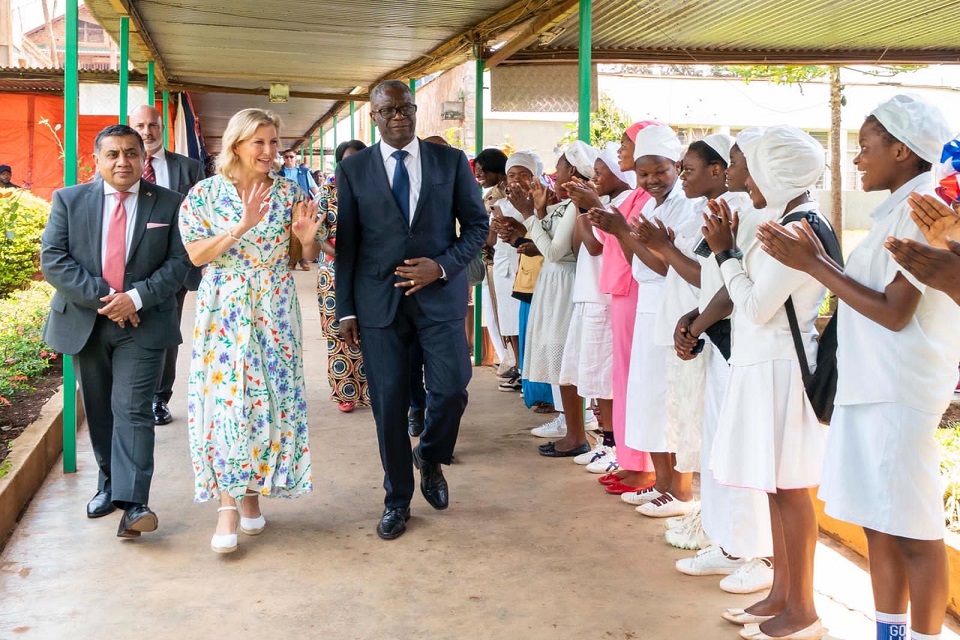
Lord (Tariq) Ahmad of Wimbledon Minister of State and Prime Minister’s Special Representative for Preventing Sexual Violence in Conflict, Her Royal Highness the Duchess of Edinburgh, and Nobel Peace Prize laureate Dr Denis Mukwege meet staff at the Panzi Hospital in Bukavu DRC, which specialises in treating survivors of gender-based violence.
SO4: Humanitarian response
Women’s and girls’ needs are more effectively met by humanitarian actors and interventions through needs-based responses that promote meaningful participation and leadership
In Yemen, the UK is one of largest contributors to the humanitarian response having contributed over £1 billion since the start of the conflict. The UK is continuing its leading role with a commitment to spend at least £88 million in UK aid over the course of this FY 2022 to 2023. This will provide cash assistance to 200,000 people per month (including women and girls) most at risk of acute food insecurity, health care for 800,000 women and children, and treatment for 85,000 severely malnourished children.
Between April and November 2022, the UK disbursed £228 million in humanitarian aid to Afghanistan, in addition to meeting our full commitment of £286 milliom this financial year (2022 to 2023). Through the Gender in Humanitarian Action working group, the UK supports the secretariat of the Afghan Women’s Advisory Group, which directly informs the Humanitarian Country Team.
Between 2015 and 2022, the UK contributed £107.1 million to the Iraq Humanitarian Fund. The Fund prioritised assistance to women and girls in out-of-camp and other underserved locations. Since the start of 2022, UK funding reached 225,793 women and girls through our humanitarian programming.
SO5: Security and justice
Security and justice actors are increasingly accountable to women and girls, and responsive to their rights and needs.
In Somalia, the UK funded programmes promoting respect for and adherence to human rights in the Somali National Army (SNA). Through the Early Recovery Initiative project, the UK supported the delivery of gender and human rights training, working with
a) the Somali Ministry of Defence to develop scenario-based training to be rolled out to the SNA, and
b) ensuring gender and human rights training is also a part of UK military training for the SNA.
Through our CSSF programming in Syria, the UK supported accountability efforts to bring justice to victims and survivors of torture and sexual violence. In 2022, Synergy for Justice and Lawyers and Doctors for Human Rights trained a cohort of 15 Syrian medical doctors (5 women, 10 men) as expert documenters of torture and sexual violence based on the Istanbul Protocols.
A UK Human Security Expert has provided direct support to NATO (operational level) exercises in the role of a Gender Adviser and has supported the Nordic Centre for Gender in Military Operations, who deliver the NATO Gender Focal Point and Advisers courses. The centre assists the military in integrating gender perspectives into the planning, execution and evaluation phases of operations through education and training. The centre also assists the integration of gender into military exercises and supports continued cooperation through a network of key experts and institutions.
SO6: Preventing and countering violent extremism
Ensure the participation and leadership of women in developing strategies to prevent and counter violent extremism.
In Syria, through CSSF programming the UK supported women to prepare for reintegration back to their original communities and reduce the risk of radicalisation. Activities and information sessions in Hajin have targeted Al Hol camp returnees including 60 women to provide them with access to information about basic services in the community and support services available by NGOs.
As part of our £48.6 million CSSF Lake Chad Basin programme in Nigeria, we have funded projects with women-led civil society organisations that aim to include women’s perspectives in transitional justice and reintegration of former violent extremist associates.
Since 2019, the UK Government has also committed £14.2 million to stabilisation initiatives in the Lake Chad Basin region to provide security infrastructure, livelihoods, and basic services to discourage people, including women, from joining violent extremist groups.
SO7: UK capabilities
HMG continues to strengthen its capability, processes and leadership to deliver against WPS commitments
In 2022, the UK scaled up its in-country coordination with key WPS donors and embassies (Canada, Australia and Norway) in Myanmar by forming a ‘WPS Small Group’. This coordination has led to collective consultations with women-led organisations and UN counterparts, joint advocacy and coordinated programming to cover WPS gaps - strengthening WPS capabilities is also key to the development of expertise on WPS at a domestic level. From 2022 until 2025, CSSF are providing a cross-government WPS Helpdesk to strengthen UK capability on WPS. The Helpdesk is a call-down facility that provides high quality, evidence informed analysis and expertise on WPS issues and can support gender-sensitive conflict and security policy and programming, and boost UK capacity to advance its WPS NAP. In 2022, some of the key publications included ‘Mapping of Women, Peace and Security initiatives, actors and opportunities in Ethiopia’ and ‘Understanding the Role of Gender-based Online Hate Speech in Exacerbating Conflict and Violence’.
The MOD continued to deliver its Human Security Advisers Course in November 2022 to 25 individuals from the Army, Royal Navy and Royal Air Forces as well as the civil service. This course is for staff working in operational or strategic staff and planning roles in Defence, to ensure they are incorporating Human Security and Gender perspectives into their activities.
Focus countries
Afghanistan, Democratic Republic of the Congo, Iraq, Libya, Myanmar, Nigeria, Somalia, South Sudan, Syria.
Final evaluation of the UK’s fourth WPS NAP 2018 to 2022
The final evaluation of the UK’s fourth NAP was conducted by Gender Associations, an international consulting firm that specialises in gender equality and human rights in fragile and conflict-affected contexts. The purpose of the evaluation was to test the effectiveness of the UK’s approach to WPS with the aim of informing the development and strategic direction of the fifth UK NAP. The evaluation included a review of key documents and interviews across government, as well as 4 case studies: Jordan, Libya, Mali and UK engagement with the UN. These case studies were selected to cover the varied ways in which the UK delivers the WPS agenda both bilaterally and in the multilateral space.
The final evaluation is published in full alongside this report; key highlights are outlined below and were fully considered as part of the development of the UK’s fifth WPS NAP (2023 to 2027).
Achievements
- the evaluation found that supporting NAP development in select countries was particularly impactful. Over the course of the last NAP, the UK has supported the development of NAPs through technical support and funding in many countries including Argentina, Azerbaijan, DRC, Egypt, Indonesia, Iraq, Jordan, Kenya, Lithuania, Nigeria, Northern Macedonia, South Africa, Uruguay, Vietnam and Yemen
- another key success was the UK’s focus on the protection of women in conflict and humanitarian emergencies, particularly from sexual and gender-based violence, both through multilateral spaces and in focus countries
- the main driver for successful delivery of WPS priorities was the personal commitments and expertise of senior leadership at UK embassies
- the UK’s continuous leadership in advancing the WPS agenda as a Permanent Member of the UN Security Council along with its role in NATO, the OSCE and the African Union helped ensure that WPS remained an international priority
- in 2021, the UK used its Presidency of the G7 to galvanise international action through the G7’s first ever G7 famine prevention and humanitarian crises compact. The compact commits G7 nations to support action to prevent and respond to GBV, including the economic harm and the health impacts experienced by women and girls in conflict and crises
- the UK plays a leading role in donor coordination and has been active in using the NAP to engage in policy dialogue with partner countries active on WPS, especially Canada, Norway, and Germany
The evaluation highlighted key challenges:
- the domestication of the WPS agenda is largely absent with limited focus on domestic policy
- a lack of a clear deliverables and monitoring and evaluation system limited the UK’s ability to measure impact
- there is a need for increased resources (human, technical and financial) to support NAP development, implementation, coordination, and monitoring across the range of countries and actors
Looking ahead
The recently launched UK’s fifth WPS NAP set out an ambitious new approach to WPS policy over the next 5 years including to include domestic angles to the NAP and to bring greater focus to monitoring and evaluation.
We would like to extend our thanks to the APPG, civil society organisations and all women activists across the globe, who have been instrumental in supporting the implementation of the UK’s WPS NAP 2018 to 2022.
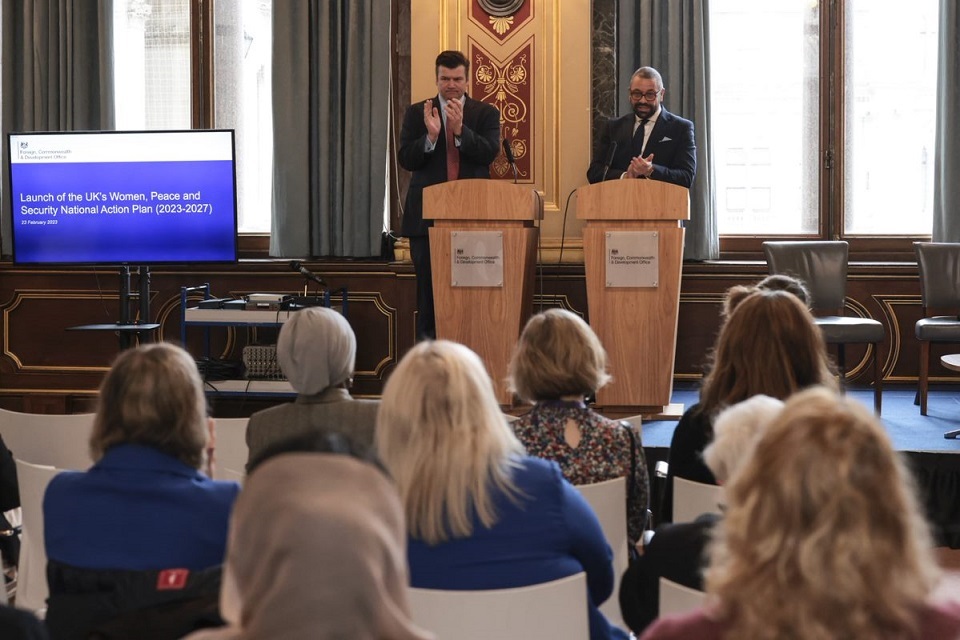
Rt Hon James Cleverly, UK Foreign Secretary, and Rt Hon James Heappey, UK Minister of State for the Armed Forces launch the UK’s fifth WPS National Action Plan at the FCDO in February 2023.
-
A 1-page declaration, outlining the main principles to ensure the rights and wellbeing of children born of sexual violence on conflict - Ensuring the rights and wellbeing of children born of sexual violence in conflict: call to action - GOV.UK (www.gov.uk) ↩
-
Platform for action promoting rights and wellbeing of children born of conflict-related sexual violence - GOV.UK (www.gov.uk) ↩
